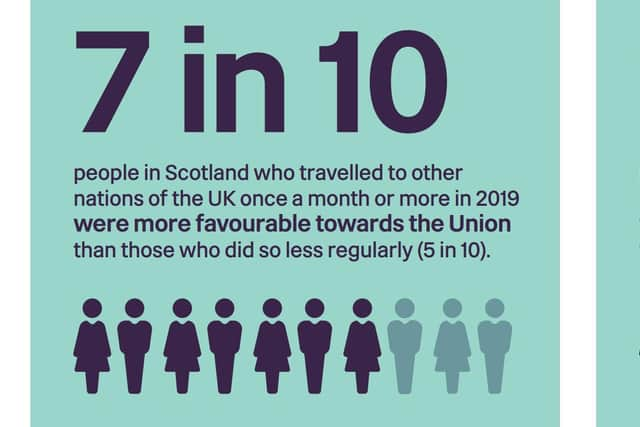Union Connectivity Review a ham-fisted attempt to serve political ideology rather than transport need – Alastair Dalton
The UK government-commissioned study stated that seven in ten people in Scotland who travelled to other nations of the UK once a month or more in 2019 were more favourable towards the Union than those who did so less regularly. The latter group was evenly divided, with five in ten of them favourable towards the Union.
The obvious implication, for supporters of Scotland remaining part of the UK, is that making it easier to travel to the other nations, especially England, will reduce support for independence.
Advertisement
Hide AdAdvertisement
Hide AdHowever, regardless of whether Scotland ultimately goes its own way or not, improvements to cross-Border transport links will be required.


It’s not as if nationalists are planning to float the country off to be nearer the rest of Europe, or even further away from England, much as they might love that prospect.
Despite this, the entire UCR process has been a unnecessarily ham-fisted attempt to serve political ideology rather than transport need.
I’ve said before that when transport becomes political, all sense and logic goes out of the window – we saw that with the witch-hunt of ministers when a structural fault closed the Forth Road Bridge almost exactly six years ago.
This time round, rather than a constructive, collaborative project to consider how cross-Border transport could be improved, the UCR has become an acrimonious turf war between the UK and Scottish governments.


What a contrast with the Covid pandemic, where the two administrations have avoided such a major falling out, with the UK government largely respecting devolved powers over health, despite a markedly different approach to dealing with the pandemic.
The upshot has been a review in which Scottish government refused to take part, with many Scottish local authorities absent too.
As a result, the UCR has failed to make any significant progress, as its chair Sir Peter Hendy acknowledged in his foreword: “In most cases, the report does not contain brand new detailed infrastructure proposals; that cannot be a surprise, given the lack of attention as a result of devolution.”
Advertisement
Hide AdAdvertisement
Hide AdThe review recommended further improvements to the two cross-Border rail lines – without any details.
Train operators have been lobbying for this on the west coast route for years, while an upgrade is already underway on the east coast route.
It also called for upgrading of the A75 through Dumfries and Galloway – the main route between England and the ferry ports for Northern Ireland – which Transport Scotland is already considering.
But, in what could be argued as conciliatory wording, the report said funding should be offered to support the upgrade.
It also highlighted the “safety issues” of gaps in the A1 dual carriageway between Edinburgh and Newcastle, without explaining that – according to my expert source – the Scottish sections of single carriageway have been rebuilt to current standards, unlike those south of the Border.
The report noted that while devolution had been good for transport, it had at times lowered the priority of cross-Border schemes.
A mature approach by ministers on both sides of the divide, geographically and politically, is now needed.
A message from the Editor:
Thank you for reading this article. We're more reliant on your support than ever as the shift in consumer habits brought about by coronavirus impacts our advertisers.
If you haven't already, please consider supporting our trusted, fact-checked journalism by taking out a digital subscription.
Comments
Want to join the conversation? Please or to comment on this article.
